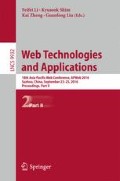Abstract
Spatial co-location rule mining plays an important role in spatial data mining. The usefulness of co-location rules is strongly limited by the huge amount of discovered rules. To overcome this drawback, several methods were proposed in the literatures. However, being generally based on statistical information, most of these methods do not guarantee that the extracted co-location rules are interesting for the user. Thus, it is crucial to help the decision-maker with an efficient processing step to reduce the number of co-location rules. This demonstration presents OICRM, an interactive system to discover interesting co-location rules based on the ontology. First, the ontology is used to improve the integration of user knowledge; next, a powerful formula sub-system is designed to easily represent domain’s background and constraint knowledge; finally, OICRM has an interactive post-processing step (the secondary mining) to reduce the number of rules furthermore.
Access this chapter
Tax calculation will be finalised at checkout
Purchases are for personal use only
References
Huang, Y., Shekhar, S., Xiong, H.: Discovering co-location patterns from spatial data sets: a general approach. IEEE Trans. Knowl. Data Eng. (TKDE) 16(12), 1472–1485 (2004)
Wang, L., Zhou, L., Lu, J., et al.: An order-clique-based approach for mining maximal co-locations. Inf. Sci. 179(2009), 3370–3382 (2009)
Xin, D., Shen, X., Mei, Q., et al.: Discovering interesting patterns through user’s interactive feedback. In: 12th ACM SIGKDD International Conference on Knowledge Discovery and Data Mining, pp. 773–778 (2006)
Bao, X., Wang, L., Fang, Y.: OSCRM: a framework of ontology-based spatial co-location rule mining. J. Comput. Res. Dev. 52(Suppl), 74–80 (2015)
Marinica, C., Guillet, F.: Knowledge-based interactive postmining of association rules using ontologies. IEEE Trans. Knowl. Data Eng. 22(6), 784–797 (2010)
Acknowledgements
This work was supported in part by grants (No. 61472346, No. 61262069) from the National Natural Science Foundation of China and in part by a grant (No. 2016FA026, No. 2015FB149, and No. 2015FB114) from the Science Foundation of Yunnan Province.
Author information
Authors and Affiliations
Corresponding author
Editor information
Editors and Affiliations
Rights and permissions
Copyright information
© 2016 Springer International Publishing Switzerland
About this paper
Cite this paper
Bao, X., Wang, L., Wang, M. (2016). OICRM: An Ontology-Based Interesting Co-location Rule Miner. In: Li, F., Shim, K., Zheng, K., Liu, G. (eds) Web Technologies and Applications. APWeb 2016. Lecture Notes in Computer Science(), vol 9932. Springer, Cham. https://doi.org/10.1007/978-3-319-45817-5_67
Download citation
DOI: https://doi.org/10.1007/978-3-319-45817-5_67
Published:
Publisher Name: Springer, Cham
Print ISBN: 978-3-319-45816-8
Online ISBN: 978-3-319-45817-5
eBook Packages: Computer ScienceComputer Science (R0)

